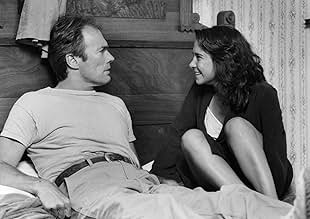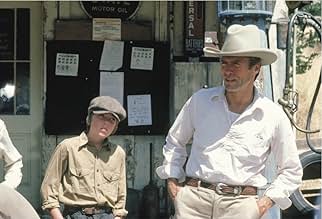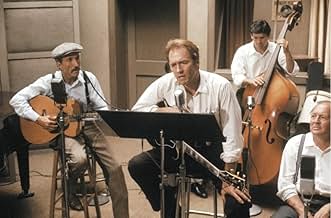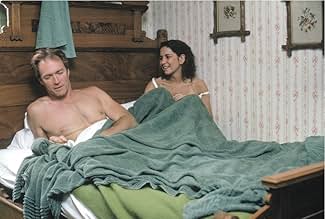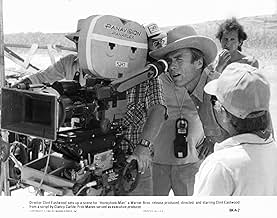Honkytonk Man
- 1982
- Tous publics
- 2h 2min
NOTE IMDb
6,6/10
9,9 k
MA NOTE
Red, musicien ambulant, retourne à la ferme familiale en Oklahoma et y retrouve un paysage dévasté par un ouragan. Il est gravement malade et pourtant, une dernière chance s'offre à lui. Une... Tout lireRed, musicien ambulant, retourne à la ferme familiale en Oklahoma et y retrouve un paysage dévasté par un ouragan. Il est gravement malade et pourtant, une dernière chance s'offre à lui. Une convocation pour une audition à Nashville.Red, musicien ambulant, retourne à la ferme familiale en Oklahoma et y retrouve un paysage dévasté par un ouragan. Il est gravement malade et pourtant, une dernière chance s'offre à lui. Une convocation pour une audition à Nashville.
- Réalisation
- Scénario
- Casting principal
- Récompenses
- 1 nomination au total
Avis à la une
Set in Depression era Oklahoma, this film tells the story of a dirt poor, alcoholic singer named Red Stovall (Clint Eastwood), who heads out for Nashville, in hopes of making it big as a country singer. The story begins on a dilapidated farm composed mostly of dust, where Red's sister hesitatingly allows her son Whit (Kyle Eastwood) to go with Red to Nashville. The kid's Grandpa (John McIntire) also wants to go, to return to his native Tennessee. The film's beginning is dreary and depressing, but wonderfully realistic of the dust bowl days of the 1930s.
Much of the plot takes place on the road, as the three travelers encounter an assortment of characters and problems along the way. The most important character they meet is a young girl named Marlene (the late Alexa Kenin), who yearns to be a country singer. It's one of many plot contrivances, but at least this contrivance offers some humor, especially when Marlene ... "sings". Other plot contrivances include a jailbreak, an angry bull, an aborted robbery, and an incident involving a chicken coop.
If the film's weakness is excess contrivances, the film's strength is the portrayal of Red as an interestingly complex character. He coughs a lot, a symptom of tuberculosis. And the TB is getting worse. The question is ... will Red be able to reach the promise land before the disease affects his ability to sing? And, in a long monologue aimed at Whit, Red talks about his long-ago love affair with Mary Sims.
The film's acting is credible, if not outstanding. Kyle Eastwood does a nice job as Whit. The film also features cameos by several then-current country singers. At the end, there's some sad real-life irony as Marty Robbins helps Red.
"Honkytonk Man" has some good atmosphere. Arguably, the best segment is at the Top Hat Club on Beale Street in Memphis, where the great Linda Hopkins belts out a blues number. If the film's writer had ditched some of those hokey "on the road" contrivances, and focused the plot more in smoky old bar rooms with low light levels and mournful music, the film would have been a lot better. As is, "Honkytonk Man" is still worth a look, if for no other reason than to see a low-key character study, in contrast to the brash and gaudy big ticket films of that cinematic era, like "Raiders Of The Lost Ark" and "Star Wars".
Much of the plot takes place on the road, as the three travelers encounter an assortment of characters and problems along the way. The most important character they meet is a young girl named Marlene (the late Alexa Kenin), who yearns to be a country singer. It's one of many plot contrivances, but at least this contrivance offers some humor, especially when Marlene ... "sings". Other plot contrivances include a jailbreak, an angry bull, an aborted robbery, and an incident involving a chicken coop.
If the film's weakness is excess contrivances, the film's strength is the portrayal of Red as an interestingly complex character. He coughs a lot, a symptom of tuberculosis. And the TB is getting worse. The question is ... will Red be able to reach the promise land before the disease affects his ability to sing? And, in a long monologue aimed at Whit, Red talks about his long-ago love affair with Mary Sims.
The film's acting is credible, if not outstanding. Kyle Eastwood does a nice job as Whit. The film also features cameos by several then-current country singers. At the end, there's some sad real-life irony as Marty Robbins helps Red.
"Honkytonk Man" has some good atmosphere. Arguably, the best segment is at the Top Hat Club on Beale Street in Memphis, where the great Linda Hopkins belts out a blues number. If the film's writer had ditched some of those hokey "on the road" contrivances, and focused the plot more in smoky old bar rooms with low light levels and mournful music, the film would have been a lot better. As is, "Honkytonk Man" is still worth a look, if for no other reason than to see a low-key character study, in contrast to the brash and gaudy big ticket films of that cinematic era, like "Raiders Of The Lost Ark" and "Star Wars".
As with most movies i prefer to read professional critics after viewing,although i do sometimes read them first. Frankly as a retired sound man i do not allow critics to influence me either way. This movie with (my first viewing of a Clint family member)Kyle succeeded in roller coasting emotion from humour to unsentimental portrayals of all the cast. I looked out for Marty Robbins, whose name was referred to as the one (albeit brief) sole touching moment in the film. It was undoubtedly a touching moment, but certainly not the only one. The entire theme was skillfully intertwined with some really great songs and lyrics. This is another DVD I will add to my collection. A movie to watch, and even learn from, as to how humanity can be humble and unpretentious with subtlety, warmth and understated aggression. Clint is understandably angry, and we feel real sympathy for his place in the world he inhabits.
Despite almost every critic I've read, I think this is a real gem by Clint Eastwood. A honest, sensitive effort in the road movie tradition. The minor tone, the naive sequences soothe Red Stovall's journey to his fate. The movie also displays a touching view of the depression era in USA. Like animated Roy Emerson Stryker's pictures the photography is remarkable as well as the sound track. I've learned about lots of singers and musicians that recorded only to give a final testimony of their art. I guess stories like these deserved a movie like Honkytonk Man. Long life to Clint, one of the most underrated talents not only in Hollywood but in the rest of the world.
It took a lot of nerve in the early eighties,in the days of Rocky,Indiana Jones and "fame" to portray such a human wreck.Eastwood's character recalls Hank Williams,one of the few country singers whose songs experimented tragedy ("I'll never get out of this world alive"). The difference lies in the fact that the singer here will remain an obscure artist.
A road movie,it features an interesting boy character who learns the harsh realities of life.In the short space of a couple of days,he will have experimented love (first in a brothel,then probably later with the girl they met along the road) and death (he'll have to cope with a burial).The young female "singer" they -reluctantly-take with them provides the movie with the comic relief it does need:you should hear her sing "My bonnie" in a shrill voice.
The ballads Eastwood sings are moving and tuneful(I don't know if he is dubbed for them,but anyway it's made with taste and respect for the audience).The audition is the highlight of the movie,Eastwood seems to sing as if it were a matter of life and death(and it is anyway).The actor/director avoids pathos and melodrama.Once again,it was a very risky move to play such a character at a time when success story was the golden rule.The movie was bound to be a flop,but it deserves to be restored to favor now.
A road movie,it features an interesting boy character who learns the harsh realities of life.In the short space of a couple of days,he will have experimented love (first in a brothel,then probably later with the girl they met along the road) and death (he'll have to cope with a burial).The young female "singer" they -reluctantly-take with them provides the movie with the comic relief it does need:you should hear her sing "My bonnie" in a shrill voice.
The ballads Eastwood sings are moving and tuneful(I don't know if he is dubbed for them,but anyway it's made with taste and respect for the audience).The audition is the highlight of the movie,Eastwood seems to sing as if it were a matter of life and death(and it is anyway).The actor/director avoids pathos and melodrama.Once again,it was a very risky move to play such a character at a time when success story was the golden rule.The movie was bound to be a flop,but it deserves to be restored to favor now.
The critics didn't like this film, but I beg to differ. Perhaps I'm naive and gullible, but to me it rings true in its local color and the coping of poor people in the Depression amidst the aspirations of young and old alike.
My father, a published author in a small way, once mused to me that if he were to write a novel, it would be about someone trying to come to terms with his own mediocrity. Such is the theme of this movie, and hardly typical a consideration it is in a time when the media bombard us coast to coast, for our adulation, with the glamorous images of a mere handful of individuals who happen to have landed vast fame and fortune. What does any of this have to do with most of us? On the one hand, we live day to day. On the other, a recurring dream whispers "maybe..."
Knowing that he is living on borrowed time, Red, humble and hand-to-mouth but respected more than he knows by a few somewhat more successful colleagues (and an unusually fallible and vulnerable character for Eastwood, which he plays well) is granted, in extremis, an apparent opportunity to reach for the stars. More down-to-earth, he is also fortuitously blessed/burdened with not just one but two young proteges: first his nephew, then also a girl at loose ends. Perhaps neither is particularly talented; nevertheless both have a claim on his attention which he reluctantly fulfills in his own unassuming way, while making no exalted pretenses as to their prospects. When on his deathbed he can do no more for them, he commends them to each other. "You take care of her, now" he rasps to Whit. "She's okay. Help her with her singing." While they may never reach celebrity, the texture of life can sustain them if they face it together.
As, dying and perhaps delirious, he gazes up into Marlene's face, he sees the "raw-boned Okie woman" he had loved for several years as a mistress, and whom he later had regretted leaving. She had borne a girl whom he had never met. Marlene was a fatherless waif of about the right age. Did he recognize at the last moment his long-lost daughter? It is a question which the film leaves hanging in the air. Does genealogy matter? In practical terms, that is what she became almost too late.
For my money, it's a raw-boned, American Okie "La Boheme."
My father, a published author in a small way, once mused to me that if he were to write a novel, it would be about someone trying to come to terms with his own mediocrity. Such is the theme of this movie, and hardly typical a consideration it is in a time when the media bombard us coast to coast, for our adulation, with the glamorous images of a mere handful of individuals who happen to have landed vast fame and fortune. What does any of this have to do with most of us? On the one hand, we live day to day. On the other, a recurring dream whispers "maybe..."
Knowing that he is living on borrowed time, Red, humble and hand-to-mouth but respected more than he knows by a few somewhat more successful colleagues (and an unusually fallible and vulnerable character for Eastwood, which he plays well) is granted, in extremis, an apparent opportunity to reach for the stars. More down-to-earth, he is also fortuitously blessed/burdened with not just one but two young proteges: first his nephew, then also a girl at loose ends. Perhaps neither is particularly talented; nevertheless both have a claim on his attention which he reluctantly fulfills in his own unassuming way, while making no exalted pretenses as to their prospects. When on his deathbed he can do no more for them, he commends them to each other. "You take care of her, now" he rasps to Whit. "She's okay. Help her with her singing." While they may never reach celebrity, the texture of life can sustain them if they face it together.
As, dying and perhaps delirious, he gazes up into Marlene's face, he sees the "raw-boned Okie woman" he had loved for several years as a mistress, and whom he later had regretted leaving. She had borne a girl whom he had never met. Marlene was a fatherless waif of about the right age. Did he recognize at the last moment his long-lost daughter? It is a question which the film leaves hanging in the air. Does genealogy matter? In practical terms, that is what she became almost too late.
For my money, it's a raw-boned, American Okie "La Boheme."
Le saviez-vous
- AnecdotesThe script originally called for Whit (Kyle Eastwood) to get high from smoking marijuana, but Clint Eastwood, who is very anti-drug, refused, even with Kyle using a prop cigarette. Eastwood finally relented to his son's character getting high from a contact buzz.
- GaffesRyman Auditorium is used as the setting for the Opry. This venue was not used until the 1940s, and the movie takes place in the 1930s.
- Versions alternativesABC edited 7 minutes from this film for its 1986 network television premiere.
- ConnexionsFeatured in At the Movies: Dueling Critics (1983)
- Bandes originalesHonkytonk Man
Sung by Marty Robbins and Clint Eastwood
Meilleurs choix
Connectez-vous pour évaluer et suivre la liste de favoris afin de recevoir des recommandations personnalisées
- How long is Honkytonk Man?Alimenté par Alexa
Détails
- Date de sortie
- Pays d’origine
- Langue
- Aussi connu sous le nom de
- El aventurero de medianoche
- Lieux de tournage
- Fallon, Nevada, États-Unis(scene with bull)
- Société de production
- Voir plus de crédits d'entreprise sur IMDbPro
Box-office
- Budget
- 2 000 000 $US (estimé)
- Montant brut aux États-Unis et au Canada
- 4 484 991 $US
- Week-end de sortie aux États-Unis et au Canada
- 667 727 $US
- 19 déc. 1982
- Montant brut mondial
- 4 484 991 $US
Contribuer à cette page
Suggérer une modification ou ajouter du contenu manquant

Lacune principale
What is the Canadian French language plot outline for Honkytonk Man (1982)?
Répondre

